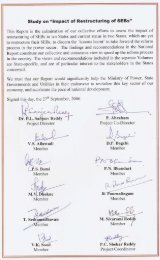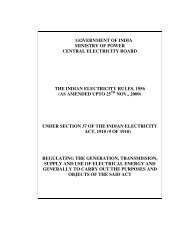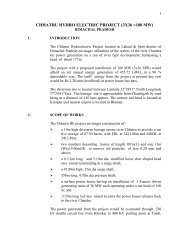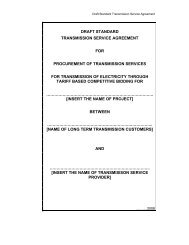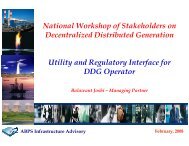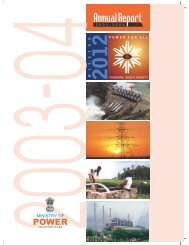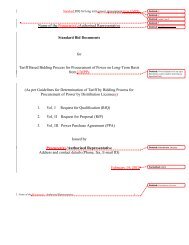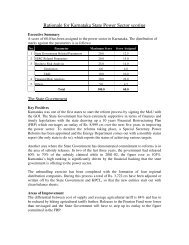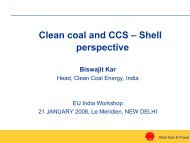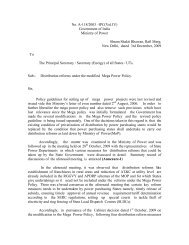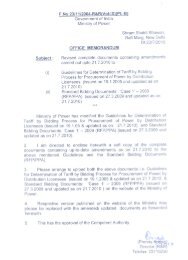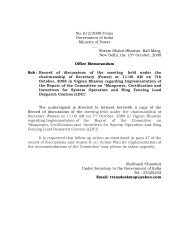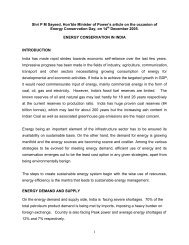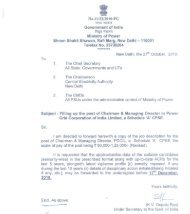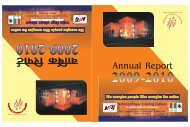MoP - Ministry of Power
MoP - Ministry of Power
MoP - Ministry of Power
Create successful ePaper yourself
Turn your PDF publications into a flip-book with our unique Google optimized e-Paper software.
28<br />
in India has been estimated by the ADB Study project team<br />
at Rs 140 bn (Rs. 14000 crores) and has the potential to<br />
save about 54 billion units <strong>of</strong> electricity annually. Scheme<br />
with an expenditure <strong>of</strong> Rs. 13.99 crores during the XI plan<br />
has been approved. The scheme targets an avoided<br />
capacity <strong>of</strong> 500 MW during the XI plan.<br />
Deliverables: The deliverables from the project are<br />
expected to be:<br />
ECBC<br />
Creating a pool <strong>of</strong> ECBC expert Architects – panel<br />
prepared<br />
Training material for various stakeholders is ready<br />
Simplified guidebook being prepared<br />
Initiation <strong>of</strong> outreach activities<br />
Initiation <strong>of</strong> 5 pilots in states- provision <strong>of</strong> technical<br />
assistance<br />
Outreach/ conferences in major state capitals<br />
Simplified compliance procedures for state and local<br />
bodies<br />
Capacity building <strong>of</strong> state and local government<br />
personnel<br />
Evaluation <strong>of</strong> code for revision<br />
Curriculum for colleges<br />
Strengthening <strong>of</strong> testing laboratories<br />
Energy Efficiency in Existing Buildings<br />
Promotion <strong>of</strong> Energy Service Companies (ESCOs);<br />
particularly for existing buildings<br />
Rating <strong>of</strong> ESCOs by CRISIL/ ICRA being initiated to<br />
improve investor confidence<br />
Standardized performance contract documents for<br />
ESCOs<br />
Innovative financial products, like securitization <strong>of</strong><br />
receivables, energy efficiency bonds to fund the<br />
projects<br />
Setting up <strong>of</strong> partial risk guarantee fund for risk<br />
mitigation<br />
4. Agricultural (Ag DSM) and Municipal (Mu DSM)<br />
Demand Side Management (DSM) Scheme<br />
Ag DSM promises immense opportunity in reducing the<br />
overall power consumption, improving efficiencies<br />
<strong>of</strong> ground water extraction and reducing the subsidy<br />
burden <strong>of</strong> the states without sacrificing the service<br />
obligation to this sector. It also presents a promising<br />
prospect <strong>of</strong> targeting subsidy to the beneficiary<br />
farmer. In terms <strong>of</strong> electricity saved, given that<br />
most <strong>of</strong> the pilot projects as well as other studies<br />
project potential savings <strong>of</strong> 45-50% by mere<br />
replacement <strong>of</strong> inefficient pumps, the overall<br />
electricity savings (from 20 million pumps) is estimated at<br />
62.1 billion units annually. A successful implementation<br />
model must address all the above variables and include all<br />
stakeholders. Provision <strong>of</strong> adequate incentive to farmers,<br />
given that they do not largely pay for electricity, is one <strong>of</strong><br />
the major constraints in implementation <strong>of</strong> the scheme.<br />
Mu DSM also assumes significance given that the<br />
Municipalities consume 10% <strong>of</strong> energy overall and the cost<br />
input <strong>of</strong> energy is as high as 60% <strong>of</strong> the costs incurred by<br />
the municipalities. Energy costs constitute up to<br />
60-70 percent <strong>of</strong> an Indian municipality's total cost <strong>of</strong><br />
pumping water to its residents. This financial constraint,<br />
coupled with inadequate or antiquated infrastructure and<br />
the lack <strong>of</strong> adequate managerial and technical capacities,<br />
greatly limits the ability <strong>of</strong> municipalities to improve water<br />
services while allowing inefficient usage <strong>of</strong> electricity. The<br />
electricity bills <strong>of</strong> the municipalities accounts for a significant<br />
part <strong>of</strong> its expenditure, given that an estimated 10% <strong>of</strong><br />
electricity is consumed for urban water pumping. The cash<br />
starved municipalities are, therefore unable to meet the<br />
service delivery standards that are fast growing urban area<br />
demands. The fact that efficient water delivery systems can<br />
translate into measurable energy savings due to reduced<br />
pumping requirements and improved performance is vastly<br />
unknown to most <strong>of</strong> the municipal authorities. Absence <strong>of</strong><br />
enabling state level policies or regulatory interventions to<br />
implement water and energy efficiency measures to<br />
improve service and reduce costs, while on the<br />
other hand, reduce power consumption <strong>of</strong> the utility does<br />
not help matters.<br />
The estimated cost <strong>of</strong> the scheme is Rs. 55.69 crores and<br />
is under consideration. Retainer Consultant for Ag DSM<br />
scheme has been appointed (PWC) and work is to start in<br />
January, 2008. For Mu DSM, bids for appointing retainer<br />
consultant have been issued and the consultant will be<br />
selected in January, 2008. The scheme targets an avoided<br />
capacity <strong>of</strong> 2000 MW during the XI plan.<br />
Deliverables: The deliverables from the project are<br />
expected to be:<br />
Business model linked to subsidy reduction being<br />
evolved<br />
Shelf <strong>of</strong> bankable DPRs to be prepared- 10 in each<br />
states (total 350) to stimulate the market<br />
Baseline development, conducive regulatory regime<br />
and payment security mechanism being worked out.<br />
Awareness and outreach to local and municipal bodies<br />
Manual for Mu DSM being developed with standard<br />
contract documents to enable easier implementation



